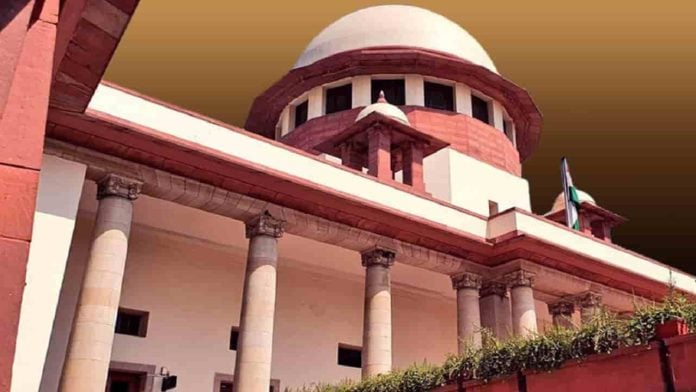A petition has been filed in the Supreme Court seeking directions to the Central government to curb the cross-border narco terrorism being spread in the border state of Manipur by armed Kuki militants infiltrating from Myanmar.
Filed by NGO ‘People’s Alliance for Peace and Progress Manipur,’ the petition alleged that illegal migrants were infiltrating from Myanmar to Manipur, calling themselves the soldiers of ‘Kukiland’.
It noted that the suspension of operation (SoO) against these militants had resulted in unhindered encroachment of reserve and protected forest land, which was being used for illegal activities like poppy cultivation, arms running and drug trafficking.
The resultant fall out of the situation was the present human crisis, wherein a large number of people had been displaced from their homes, disturbing normalcy in the state, noted the plea.
As per the petition, if narco terrorism in the north-eastern border areas of India was not acknowledged by the Union government and contained in time, it would have larger implications, posing a serious threat to the national security
The NGO sought directions to the Union government to investigate the real cause of the present unrest and take action against the militants and the illegal activities being carried out by them.
It said the Manipur High Court order seeking the state government’s response to a Centre’s 2013 letter on demand for grant of ST status to the Meitei community was a mere ruse for the attack on Meiteis and resultant spread of unrest in the state.
The petition mentioned a report released by the United Nation of Office of Drugs & Crimes in January titled ‘Major Opium Economy Expansion is Underway in Myanmar’.
The petition further said that Kuki militants and drug mafias were taking advantage of shifting drug activities (poppy plantation and drug manufacturing) from the Golden Triangle, especially the Shan State in Myanmar to the Indo-Myanmar border towards the Chin and Kachin States of Myanmar neighbouring India.
It further said that Kuki militants controlling these areas, as also the adjacent areas in Manipur and Mizoram, were emboldened by SoO to indulge in illegal poppy cultivation and drug trade to raise huge financial resources.”
Earlier on May 17, the Bench of Chief Justice of India D.Y. Chandrachud, Justice P.S. Narasimha and Justice J.B. Pardiwala had expressed strong displeasure against the March 27 order of the Manipur High Court, which suggested the state government to consider including the Meetei/Meitei community in the Scheduled Tribe list.
Terming the High Court order as ‘factually incorrect,’ the Apex Court observed that the verdict was also against the principles laid down by the Supreme Court Constitution Bench judgments as regards classification of communities as Scheduled Castes or Scheduled Tribes.
The High Court order had triggered violent clashes between tribal and non-tribal communities in Manipur, leading to the death of around 71 people.
The Bench observed that it gave time to Justice Muralidharan to correct his mistake, but he did not.
The top court of the country said that it would take a ‘strong view’ on the matter now, noting that in case the High Court judges did not follow the Constitution Bench judgments, the Apex Court knew what to do.
However, it did not stay the impugned order on the grounds that an appeal has been filed before the Division Bench of the High Court against the same.
The State of Manipur apprised the Supreme Court that a writ appeal has been filed by All Manipur Tribal Union against the High Court verdict.
The Apex Court further took note of the fact that the Division Bench had issued notice in the writ appeal and the same was slated to be heard on June 6.


